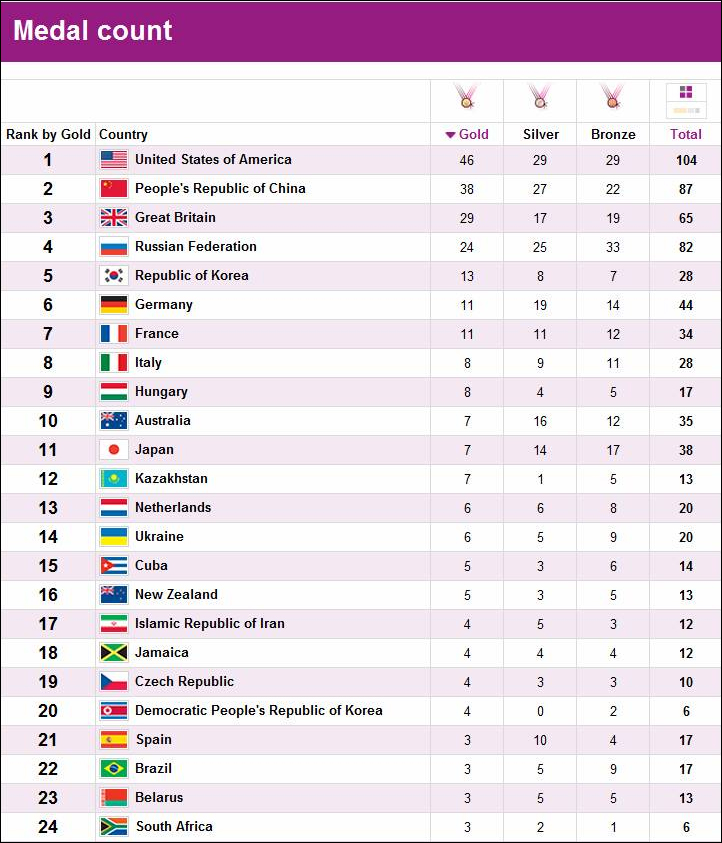A soldier of the 36 Engineering Regiment and South African swimmer
Even after failing to reach the goal of 12 medals at the London Olympics, South Africa can be proud of one of the country's best showings in decades.
The curtain fell on the London Olympics on Sunday in a whirlwind of lights and music after almost three weeks of high-octane action from the world's best athletes.
It was a period of thrills, determination, jubilation and sometimes anguish as competitors put their bodies on the line in the pursuit of gold.
Team United States, with a total of 104 medals, finished in first place; in second place were China with 87 medals and hosts Great Britain ended up in third on 65 medals.
South Africa finished in 24th place overall and scored the highest finish for any African country in London.
While not managing to get 12 medals at the Olympics, the performance was certainly something to be proud of.
Spearheaded by efforts in the swimming pool, South Africa pulled off one of its best performances at the Olympics in a century. With three gold, two silver and one bronze, South Africa's effort in London equalled its best performance since readmission to international sport in 1992.
Had the team managed one more gold medal, it would have matched efforts at the 1912 Stockholm Olympics – South Africa's best performance in history.

So close
There were chances for even more medals as members of Team South Africa fell agonisingly short of a place on the podium.
Mountain biker Burry Stander finished fifth in the mens cross country mountain biking event on Sunday, after leading for parts of the race.
Earlier in the week, Sunette Viljoen also fell just centimetres short of medal success after finishing fourth in the women's javelin.
The 2011 world championship bronze medalist's efforts in Tuesday's qualification round would have landed her a silver in Thursday's final.
There were also those who fared dismally, failing to live up to the pre-Games hype and touted success.
LJ van Zyl and Cornel Fredericks crashed out in the heats of the 400m hurdles competition, while BMX rider Sifiso Nhlapo could only manage to reach the quarterfinals of his event.
Khotso Mokoena could also not emulate his silver medal at the 2008 games in Beijing and finished seventh in the final in London.
But overall it was a respectable showing for a South African team not fancied by many experts to succeed.
'Satisfied'
The performance even seems good enough to have saved South African Sports Confederation and Olympic Committee president Gideon Sam's job after he threatened to resign if South Africa "failed" at the Games.
"I am satisfied. We surpassed expectations and we will only get better from here," Fikile Mbalula, the sports minister, told the Mail & Guardian.
Mbalula added that South Africa had "laughed in the faces" of those who believed success in London was impossible.
"Everybody talked down our chances and we went over there and achieved. We honestly did our best and you really can't ask for anything else."
The sports minister said that as soon as the rest of Olympics team return from the Games on Tuesday, preparations for the next Olympics will commence.
"The starting gun has fired for the start of preparations for Rio de Janeiro in 2016. We must harness all of the talent unearthed in the past four years to make sure we get the results we all know we are capable of," Mbalula said.
Mbalula's sentiment seems to have struck a chord with University of Cape Town sports scientist Dr Ross Tucker.
Tucker said South Africa can't afford to waste time and must build on their achievements in London to ensure success in the future.
"You don't earn Olympic medals from blood, guts and tears – you win them on years of dedication and preparation. Preparations work on an eight-year cycle and we must look to those that fared well in London to deliver in Rio," Tucker told the M&G.
With exactly 1 452 days to go until the next games in Rio, it would seem South Africa cannot wait at all.